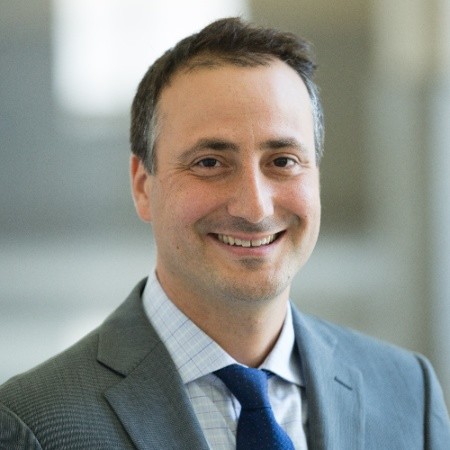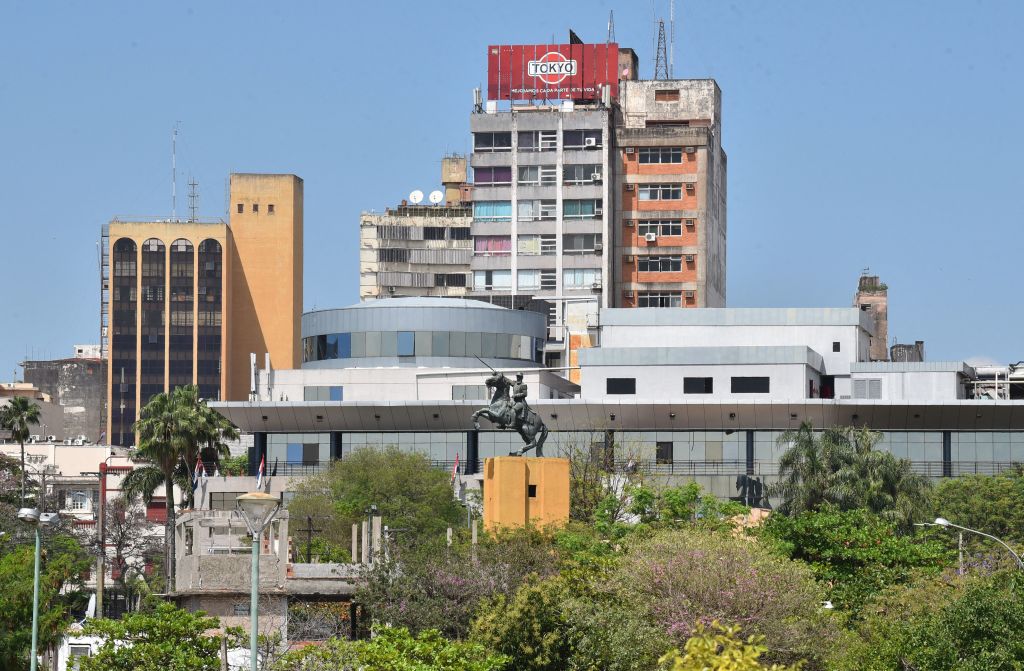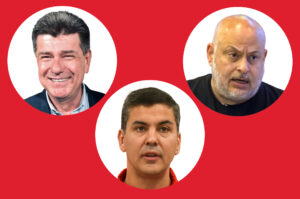ASUNCIÓN – The U.S. ambassador to Paraguay, Marc Ostfield, is getting ready to inaugurate a new embassy building on a 14-acre diplomatic compound a stone’s throw from the country’s presidential residence. But he hardly needs a ribbon-cutting ceremony to get the attention of Paraguayans.
That’s because a set of announcements over the past year by Ostfield have made waves across the country. In July, the State Department accused former President Horacio Cartes (2013-18), who is also the country’s most prominent businessman, of involvement in “significant corruption.” In August, the State Department leveled the same accusation against the current vice president, Hugo Velázquez.
Cartes and Velázquez have denied any involvement in corruption.
In January, the Treasury Department brought sanctions against Cartes and Velázquez for “systemic corruption” and “state capture.” Their conduct, Secretary of State Antony Blinken said, “undermines democratic institutions.” On March 23, the United States designated three more current or former Paraguayan officials “for involvement in significant corruption.”
The United States wields significant influence in the country and its announcements seem to have spooked many in Paraguay’s political class. Shortly after the August accusation, Velázquez suspended his candidacy in the presidential election set for April 30 and said he would resign his position as vice president, saying he did so to clear his name—later reversing himself and deciding to stay in his role.
But the Biden administration’s strategy in Paraguay, though dramatic, will not get the job done. Worse, it risks sending the opposite message, that the powerful are untouchable even when their alleged misconduct is splashed across Paraguayan newspapers. That is why the U.S. government should redouble its fight against corruption in Paraguay, first through Justice Department action and then by significantly expanding support for Paraguay’s criminal justice system to give it the tools for greater success in policing its own political class.
A shakeup for Paraguay’s political class
The U.S. allegations in Paraguay are part of a larger, regional campaign.
Elsewhere in Latin America, such as in Venezuela, the Biden administration has gone all in on the fight against corruption. The State Department regularly sanctions public officials in Haiti and in Central America, including by adding them to its “Engel List” of wrongdoers. Last year, the United States sought the arrest of former Honduran President Juan Orlando Hernández; he was extradited in April 2022. In January, the State Department accused former Panamanian President Ricardo Martinelli of corruption and banned him from visiting the United States. (Martinelli denies the accusations, and he is a leading presidential candidate.)
The allegations in Paraguay are serious, particularly those involving Cartes. The U.S. government accuses him of bribing public officials—including payments of up to $50,000 a month to loyal lawmakers—and of maintaining ties to Hezbollah, an Iranian-funded, Lebanese terrorist group. The State Department said Cartes had “obstructed a major international investigation into transnational crime” and warned of his “involvement with foreign terrorist organizations.”
The U.S. allegations stopped short of an indictment. Cartes replied in a statement last July: “I deny and reject the content of these accusations.”
More aggressive U.S. action in Paraguay could make life difficult for a large cast of bad actors. These range from terrorists, including Hezbollah, that do business in Paraguay’s Tri-Border Area, to organized crime syndicates, including Mexico’s Sinaloa Cartel and Colombian guerrillas, which reportedly smuggle Paraguayan cigarettes.
Already, the State Department’s corruption designations and the Treasury sanctions have provided a potential roadmap to local prosecutors. On March 23, Attorney General Emiliano Rolón Fernández announced the opening of an investigation into Cartes and Velázquez.
Yet in Paraguay, many question whether local authorities will follow through and thoroughly investigate the U.S. accusations. The State Department itself has complained that corrupt senior officials enjoy “a high degree of impunity” and that “politicization and corruption were pervasive throughout the judicial branch.” For almost two decades, Ciudad del Este has appeared on the U.S. government’s notorious markets report as a marketplace for counterfeit and pirated goods. Paraguayans say their country lives in the widening shadow of organized crime and institutionalized corruption; the country ranks 128th out of 180 countries on Transparency International’s Corruption Perceptions Index.
Cartes may be a particularly challenging target for the Paraguayan authorities. Though the U.S. accusations were not surprising to many Paraguayans, few in Paraguay dare criticize the former president, given his political and economic might and significant public support. Those who do sometimes avoid saying his name, calling him “the man on Avenida España,” referring to his address.
A rival of the current president, Cartes wields substantial influence in the dominant and conservative Colorado Party that has governed almost uninterrupted for seven decades. Last December, Santiago Peña, a former finance minister and an executive at one of Cartes’s companies, won the Colorado Party’s presidential primary, and Cartes won the party presidency.
Obstacles to greater U.S. involvement
For now, Paraguay is in a state of suspended animation. Amid silence from Washington, rumors circulate about potential new targets and supposedly imminent U.S. indictments and extraditions.
There is a precedent for collaboration with the United States: In the late 1970s, for example, President Jimmy Carter’s human rights advocacy helped free Paraguayan political prisoners. Today, 73% of Paraguayans have a favorable view of the United States, according to the Latinobarómetro survey.
There are several explanations for why the United States may be reluctant to go even further in Paraguay. The world is full of distractions; Paraguay is distant and landlocked; U.S. criminal investigations move slowly; and it might be difficult to scale up support for Paraguay from U.S. criminal justice experts.
There are also diplomatic considerations. Though the United States is widely admired in Paraguay, U.S. actions so far have provoked criticism about foreign intervention, particularly from Cartes’ defenders. It is also possible the Biden administration is simply delaying any possible extraditions, including of Cartes, until after Paraguay’s April elections.
Justice Department intervention could also backfire. If Peña is elected president, he would begin his term displeased by U.S. treatment of his political ally. Morevoer, the outcome of any eventual U.S. prosecution, where the burden of proof is higher than for State Department or Treasury sanctions, would be unpredictable. Finally, there is no guarantee that more aggressive U.S. actions—including extraditions and far more robust support for Paraguay’s federal prosecutors—would improve the climate of Paraguayan politics.
Still, now that the Biden administration has shown its willingness to stand up to Paraguay’s most powerful actors, it is the right moment to attempt systematic change.
—
Gedan is the director of the Wilson Center’s Latin American Program






